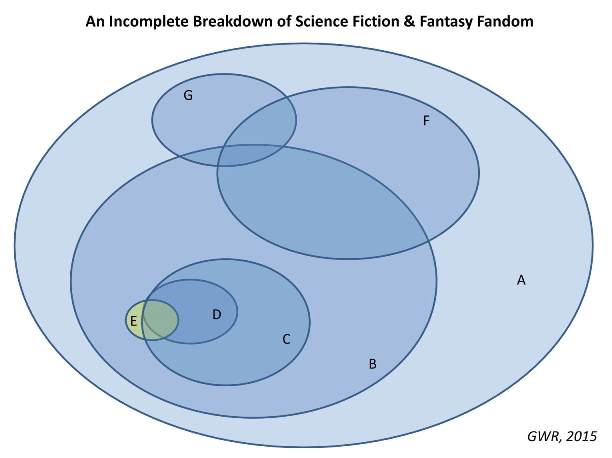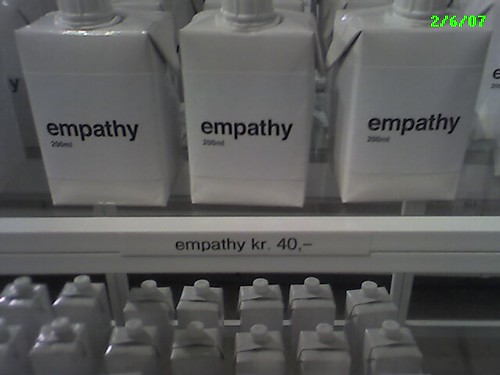Of the dozen or so people who look at my blog with any regularity, there may be one or two who are interested in the current state of upheaval regarding the Hugo Awards, which, “presented annually since 1955, are science fiction’s most prestigious award.” The rest of you can feel free to ignore this post. Most people will.
The Hugos are conferred during the World Science Fiction Convention, and are determined by nominations submitted by and final votes taken of WorldCon members. They honor science fiction and fantasy works in categories such as Best Novel, Best Dramatic Presentation, and so forth. The categories themselves have changed over the years, and it could be an interesting exercise to examine the history of why the World Science Fiction Society decided to delete some categories and add others. But that would shed little light on the current controversy within the SF&F community over the awards.
That controversy — or feud, if you prefer — centers around what it means for a work to be considered the “best.” From one perspective, it’s a question of how well the method of selection reflects the community’s preferences; from another, it’s a question of the relative merits of any single work compared to all others.
To the first question, my friend Brad Torgersen (who recently included a story of mine on the “Sad Puppies 3” slate of Hugo recommendations) used a Venn diagram (seen in this blog post) to illustrate the representational aspect of the Hugo Awards. Having thought about this for a while, I’d like to extend his diagram as follows:

(SF&F Fandom Breakdown. Inadequate, I’m afraid, but a start.)
In my diagram, the ellipses correspond to:
- A: Everyone who likes any kind of science fiction or fantasy story, whether presented as a movie, a TV show, a book, or in any other form
- B: Those who consider themselves science fiction or fantasy fans
- C: Those who attend SF&F conventions, whether general interest or fandom-specific
- D: Those who attend the World Science Fiction Convention
- E: Those who nominate or vote for the Hugo Awards — this ellipse extends beyond WorldCon because it includes “supporting members” who do not actually attend the convention
- F: People who have heard of, but don’t care about, the Hugo Awards
- G: People who, despite their consumption of science fiction or fantasy stories, would vehemently deny being science fiction or fantasy fans
I might have included people who have never heard of the Hugo Awards, if I could have figured out how to represent them. Also, I could have made the diagram more complete by trying to fit in SF&F professionals of one stripe or another, and even by trying to illustrate membership in the Science Fiction and Fantasy Writers of America and the nomination and voting for the Nebula Awards — but the picture seemed complicated enough so I stopped before it got too muddled.
At any rate, it should be clear that those who vote for the Hugo Awards are a small fraction of the “science fiction and fantasy community,” whether we consider that to consist of those who attend conventions or the larger group who consider themselves fans; indeed, Hugo Award voters are a miniscule portion of the very large group of occasional or even frequent SF&F consumers. Under the premise that the Hugo voting population has over time become less representative of the larger groups, one of the goals of the Sad Puppies campaigns has been to make ellipse E bigger by encouraging more people to become WorldCon members and to nominate and vote for their favorites.
We’ll return to this issue in a few moments.
For the second question — that of the merits of any single work compared to others — we should acknowledge that just as tastes differ from one person to another, tastes change over time. While I confess that my knowledge of the field’s history is lacking, I am given to understand that science fiction in particular used to be a literature of action as well as ideas, and that stories of characters’ accomplishments in the face of great peril or difficult moral choices were appreciated and honored. Thankfully, I can still find stories that depict moving encounters and risky endeavors; however, today those kinds of stories seem to garner less attention and fewer honors than (shall we say) more “refined” tales.
I, for one, do not seem to possess the sensibility to appreciate highly “literary” stories such as grew out of what was once considered the “New Wave” of science fiction, at least not to the degree that some of my friends seem to. Likewise, magical realism, avant garde, and “experimental” fiction leave me cold. I suppose my tastes are more pedestrian. For instance, I am unmoved by prose that is not narrative; no matter how brilliant or evocative the language is, if nothing happens in the text it will disappoint me and I will feel that the time I spent reading it was wasted. I more appreciate a story that involves interesting characters taking part in events that have consequences for themselves and others, that gives me the vicarious experience of escapades I will never attempt, in places I will never visit, with beings I will never encounter.
To select one example of how my tastes disagree with many of those who nominate and vote for the Hugo Awards, consider last year’s Nebula winner and one of the Hugo nominees for Best Short Story: “If You Were a Dinosaur, My Love.” Other than its lyrical quality, I found little to appreciate in it — and I confess to some confusion as to how it fit the definition of a story, since nothing much happens. It is barely a vignette, and since the science it discusses is all part of a “what if” postulation it seemed barely science fictional as well. If it were re-cast as “If You Were a Polar Bear, My Love,” it would carry the same emotional content and perhaps be more science fictional, since the bit about “reviving extinct species” would at least imply that it takes place in a future in which polar bears are extinct instead of the present when dinosaurs have been extinct for millions of years. In neither case would any clones have been created from extinct DNA, though, and the text would still be a stream-of-consciousness exercise in fevered imaginings rather than an actual story with characters who take actions and overcome obstacles in pursuit of particular goals. However, since that sort of thing apparently appeals to a significant cohort of SF&F fans, it might still be an award-winning “story” — though I wonder if an editor would have given either the real or this imagined version a second look if the author had been an unknown.*
While I am confessing my own literary shortcomings, I’ll add that such “stories” wear me out. When I finish reading one, I don’t feel the breathless exhilaration of stepping off a roller coaster, or even of dismounting a carousel; instead, I feel the out-of-breath exhaustion of setting down a snow shovel, or saying goodbye to unwanted houseguests. I wonder how many readers, upon completing some inaccessible text, think well of themselves for putting forth the effort, like feeling good for eating one’s peas, and transfer that feeling of accomplishment to the text when it comes time to nominate or vote for awards. I also wonder how many — some fewer, I’d wager — enthusiastically repeat the reading experience for the sheer joy of it, or go looking for seconds. And if a story does not induce a reader to read it again, or to seek out others like it or other works by the same author, can it truly be the “best” the field had to offer?
I acknowledge that stories that leave me empty may leave other people exhilarated, or inspired, or with some other positive feeling, and who am I to gainsay their opinions? So I am left to congratulate the winners — the “bests” — while I shake my head in wonder. I suppose that if a story that fit my preferences were to win, other readers would be able to find fault with it and shake their heads in wonder that anyone would select it. Such is the nature of all electoral contests.
Unfortunately for me, science fiction (and, to some degree, fantasy) literature has of late elevated the status of “literary” works while ignoring more action-oriented fiction; at the same time, sales of SF literature have either stagnated or declined. Correlation is not causation, however, so we cannot automatically conclude that the rise of “literary” SF has adversely affected overall sales. Other factors may be at play, such as the mainstream acceptance of technologies that were once the purview of science fiction, and thus the loss of appeal of technology-based stories; the declining confidence in the ability of science and engineering to solve pressing problems, likewise; or the migration of segments of the population who used to read for entertainment to other forms such as movies, television, and video games.
And that leads us back to the first question, whether the Hugo Awards adequately represent the preferences of the SF&F-consuming public.
If I had more free time, I might attempt a comprehensive statistical history of the Hugos. Maybe I can go back to school someday, pursue an advanced degree in the history of ideas, and write a thesis on the subject. For instance, I’d be interested in digging up the records starting with the first Hugos — when the best novel award, for example, went to The Demolished Man by Alfred Bester — and examining, year over year,
- The complete voting results, both for nominations and awards, including numbers of nominations received and numbers of votes cast
- The numbers of eligible works, e.g., how many science fiction and fantasy novels, etc., were published in the appropriate year
- Reported sales figures for the nominated novels, both prior to and after their nomination and prior to and after the award announcement
- Sales figures for other SF&F entertainments, e.g., box office receipts, for the same time period
- Etc.
It might be interesting to examine other tidbits as well, like the numbers of ballots (nomination or voting) disqualified for any reason. Unfortunately, those kinds of figures may not even have been recorded.
Though I do not have actual figures to present, can we conjecture what they might be likely to show?
Over time, the percentage of novels receiving nominations would fluctuate, but we might expect it to be generally lower now as independent publishing has flourished in the Internet era. We might therefore expect the votes cast for, say, Best Novel to have declined as a percentage of total novel sales for any given year. If we could devise some estimate of genre consumption in the total SF&F community (ellipse A, above), we would certainly expect the vote ratios for Best Novel to have declined because of the permeation of science fiction and fantasy into the larger culture since the 1970s. If these expectations hold true, then it should be clear that the Hugo Awards today reflect only a tiny fraction of the SF&F community.
Is that, however, a status quo we should accept?
If we believe in science fiction and fantasy as worthy art forms, capable of helping us examine the human condition and cope with change in ways that other entertainments do not, then it seems that enlarging our community would be a good thing both from a pragmatic viewpoint — more customers can support more content producers — and from the standpoint of wanting to impact the world around us. To that end, encouraging people to support the World Science Fiction Convention and participate in nominating and voting for the field’s most prestigious award should be a good thing. I cannot think of a good reason for anyone to prefer for the field and its flagship award to be small and insular, because if that continues (and especially if the SF&F field shrinks too much) many more puppies of all breeds will be saddened.
It may be that what is needed is a new, more comprehensive award. I used to tell people that I thought of the Nebula Awards as equivalent to the Oscars and the Hugo Awards as equivalent to the People’s Choice Awards, but I think I was wrong in that assessment. It seems to me now that the Nebula Awards are more akin to the Screen Actors Guild Awards, the Hugo Awards are more akin to the Oscars (except that anyone can pay to participate in the Hugos), and that science fiction and fantasy do not have an award equivalent to the People’s Choice Awards. That discussion, however, will have to wait for another day.
Or maybe not. Even if awards multiplied like tribbles, they would still be only partly representative of the community as a whole. Those of us who nominate and vote will remain a self-selected cohort, and in the end the opinions we represent are only our own.
In closing, a personal note. I am neither the scholar nor the student of the SF&F field that I should be, but I respect it enough to have chosen it for my second career and I respect the Hugo Awards for their attempt to honor the best of the genre. And, yes, I would be quite pleased to count myself as a Hugo Award nominee or recipient. I imagine every author who has considered their work to be publishable and risked sending it to editors for possible rejection must at some time have thought of winning such an accolade, though some may not want the recognition (or the notoriety, as the case may be). For my part, I was quite happy when Brad Torgersen told me he was considering my novelette** for his slate of recommendations, if for no other reason than it meant that a few more people might read it than otherwise would. And if anyone liked my story enough to bestow on it a nomination, that would do my heart good.***
A final, really personal note. My blog posts are usually much shorter than this, and if you made it this far, and actually read this whole thing, I appreciate it. Thank you, sincerely, for your time.
___
*It may not be fair, but we (and by that royal “we” of course I mean “I”) do pay a smidgen more attention to works by authors whose names we recognize. We are, most of us, pretty human in that respect.
**Specifically, from the May 2014 issue of Orson Scott Card’s Intergalactic Medicine Show, “Ashes to Ashes, Dust to Dust, Earth to Alluvium.”
***I don’t have any illusions about actually winning. The one time an editor told me one of my stories was award-worthy it didn’t come close to making the list, and I can count on one hand, with fingers left over, the number of people who told me they nominated it.
___
RELATED POSTS ABOUT THE CONTROVERSY:
– From 2014, Larry Correia offers An explanation about the Hugo awards controversy
– Brad Torgersen, in January, Announcing SAD PUPPIES 3!
– Brad Torgersen presents his recommendations in SAD PUPPIES 3: the 2015 Hugo slate
– Brad Torgersen offers SAD PUPPIES: some responses to the fallout
– Larry Correia with a Sad Puppies 3 Update
– Sarah Hoyt discusses the matter at When Duck Noises Fail Me
– Brad Torgersen expounds on SAD PUPPIES: the march of the straw men
___
Edited to note that “If You Were a Dinosaur, My Love” won the Nebula and was nominated for the Hugo. I had mixed up its accolades. GWR



 by
by 
![]()















